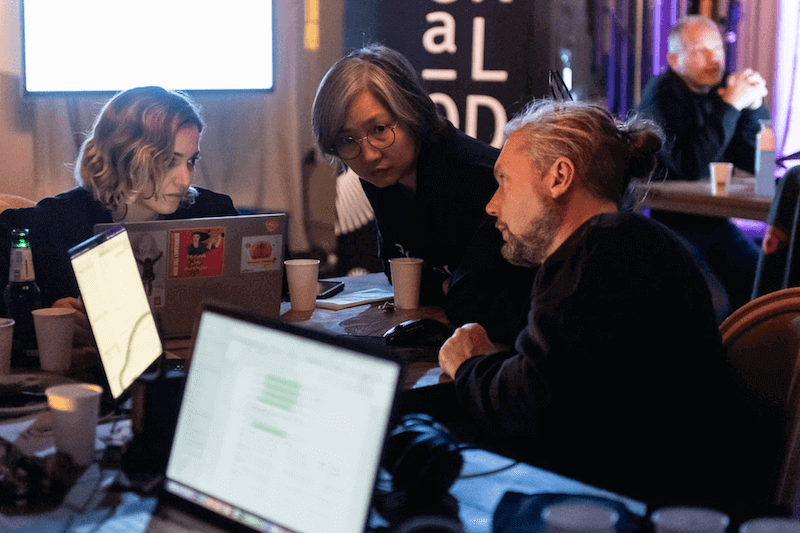HackaLOD 2024: een nacht vol innovatie met erfgoeddata
Elf teams uit vier landen kwamen in de nacht van 8 op 9 november samen in het Olympisch Stadion Amsterdam. Tijdens de achtste HackaLOD, dé hackathon voor het erfgoedveld, brachten ze digitaal erfgoed op nieuwe manieren tot leven - met verrassende apps, games en andere toepassingen die erfgoeddata voor iedereen toegankelijk maken. Go to the English version of this article.
Beproefd recept
HackaLOD volgt al tien jaar een beproefd recept: breng een stel gedreven teams een nacht lang samen op een historische locatie, zorg voor de innerlijke mens en de juiste faciliteiten, en laat ze aan de slag gaan met de rijke datasets van erfgoedorganisaties en nieuwe technieken zoals linked data en machine learning. En wat blijkt? De volgende dag liggen er steevast verrassende ideeën voor apps, games en andere erfgoedtoepassingen. Ook tijdens deze achtste editie maakten de teams deze belofte waar.
Community
‘Door het samenbrengen van creativiteit, kennis en enthousiasme ontstaat er een nieuwe dynamiek,’ zegt Enno Meijers, Chief Technology Officer bij het Netwerk Digitaal Erfgoed. ‘Nog mooier is dat er een hechte community ontstaat, dankzij het samen beleven van de nacht, met alle ongemakken én plezier. Ook in deze editie zagen we vertrouwde gezichten in steeds nieuwe teams – deelnemers weten elkaar steeds makkelijker te vinden.’
Interdisciplinaire teams
‘Het verschil tussen mijn eerste HackaLOD (negen jaar geleden) en de afgelopen editie is als dag en nacht,’ zegt Richard Zijdeman (IISG) van team Mambo, dat de juryprijs won met de app ‘LODLYMPICS’. ‘Elk jaar zijn er meer linked datasets en is het niveau hoger. Dat komt natuurlijk doordat we tegenwoordig technisch verder zijn dan tien jaar geleden. Maar de echte kracht zit in de toenemende interdisciplinariteit: teams combineren nu expertise op het gebied van erfgoed, taal, beeld, data en software.’
Volwassen vakgebied
Jurylid Erwin Folmer ziet diezelfde ontwikkeling: ‘Het veld heeft een nieuw volwassenheidsniveau bereikt, waarbij teams vol vertrouwen linked data creëren en toepassen. De interfaces die zij hebben ontwikkeld, tonen een veelbelovend potentieel voor toekomstige toepassingen.’ Enno Meijers vult aan: ‘Het niveau van de projecten blijft stijgen – niet alleen de winnaars zijn indrukwekkend, alle teams leveren steeds sterkere resultaten.’
Inspireren en leren
‘We hebben als team enorm genoten,’ zegt Ilse Rombout (Stadsarchief Amsterdam) van team Mekluppie, winnaar van de publieksprijs met ‘MijnClub.nu’. ‘We hebben van elkaar geleerd, zijn geïnspireerd door de andere teams en hebben ontzettend veel lol gehad.’
Kracht van linked data
‘De hele ervaring geeft mij en mijn collega Merel Geerlings energie om linked open data verder uit te dragen binnen het Stadsarchief Amsterdam,’ vindt Ilse. ‘Het is ontzettend belangrijk om te laten zien waar je het allemaal voor doet. Tijdens zo’n HackaLOD bewijs je dat linked open data werkt én dat je gebruikers iets kunt bieden wat anders niet mogelijk zou zijn.’
Foto’s: Jacqueline van der Kort / Beeldstudio KB
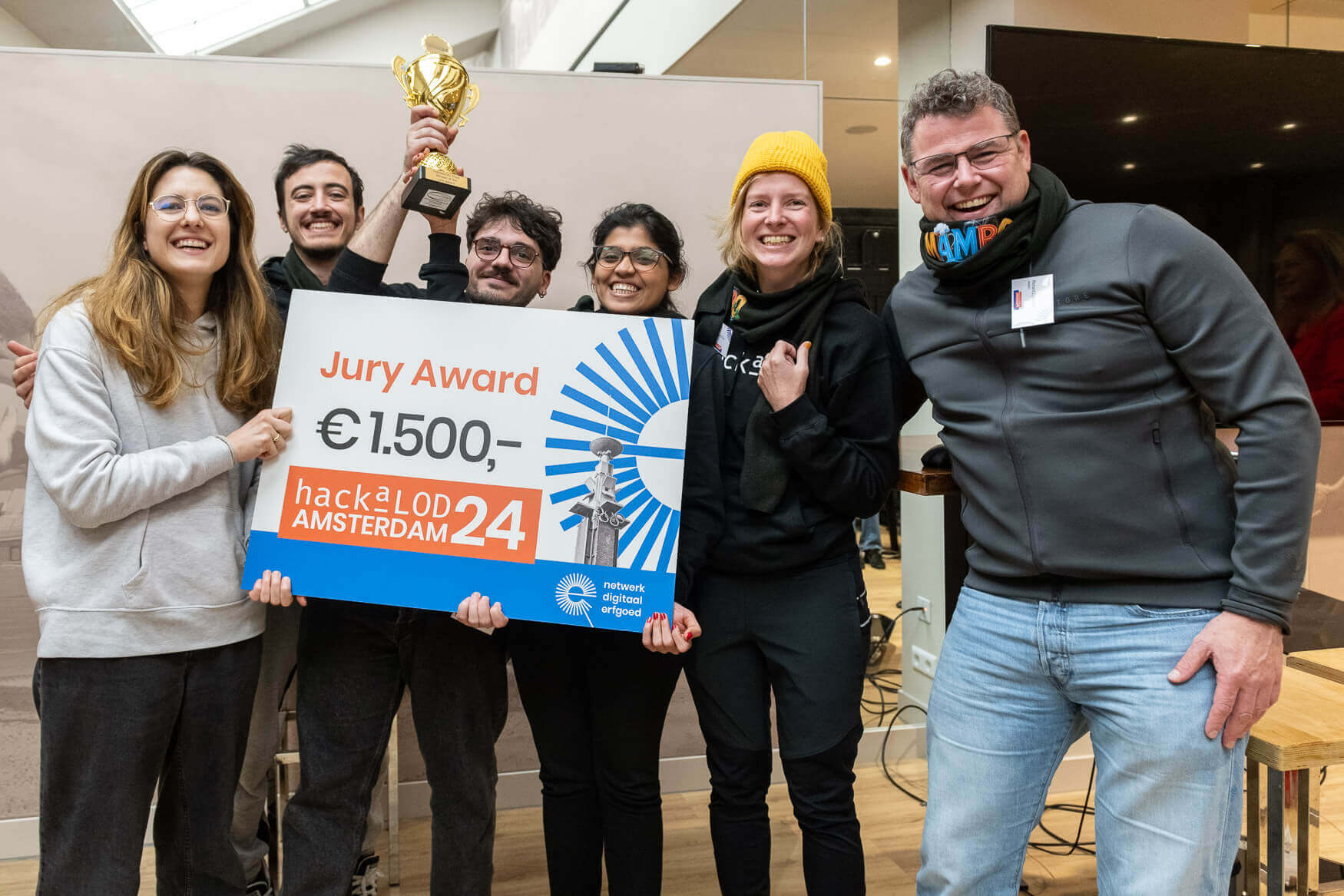
Team Mambo (winnaar juryprijs)
Teresa Paccosi, Bruno Sartini, Andrea Schimmenti, Gauri Bhagwat, Marieke van Erp en Richard Zijdeman
Het project
De inspiratie voor dit project kwam van sporthistoricus Jurryt van de Vooren tijdens de HackaLOD Summerparty, die potentiële deelnemers aanspoorde om verder te kijken dan alleen sporthelden en GOATs (de greatest of all times).
Het team ging aan de slag met een breed scala aan bronnen: teksten uit Wikinews en krantenartikelen uit Delpher, afbeeldingen uit 153 archieven via Europeana en gelinkte gegevens uit Wikidata. Het opschonen en verrijken van de data leverde meteen resultaat op: waar ze eerst 400 atleten vonden in Wikidata met een ingewikkelde query (vraag), groeide dit aantal na standaardisatie van termen in Wikidata uit naar meer dan 14.000 met een simpele query. Met behulp van slimme taalanalysetechnieken werden niet alleen relevante teksten gevonden, maar werd ook duidelijk hoe verschillend er wordt geschreven over mannelijke en vrouwelijke atleten en atleten van kleur.
Al deze inzichten en data komen samen in de app ‘LODLYMPICS’, waar gebruikers zelf door het materiaal kunnen zoeken en hun eigen sportverhalen kunnen maken.
Het juryoordeel
‘Historische verbanden kunnen nu worden geanalyseerd alsof ze real-time plaatsvinden, wat nieuwe manieren biedt om de geschiedenis met elkaar te verbinden en onderzoek te doen.’
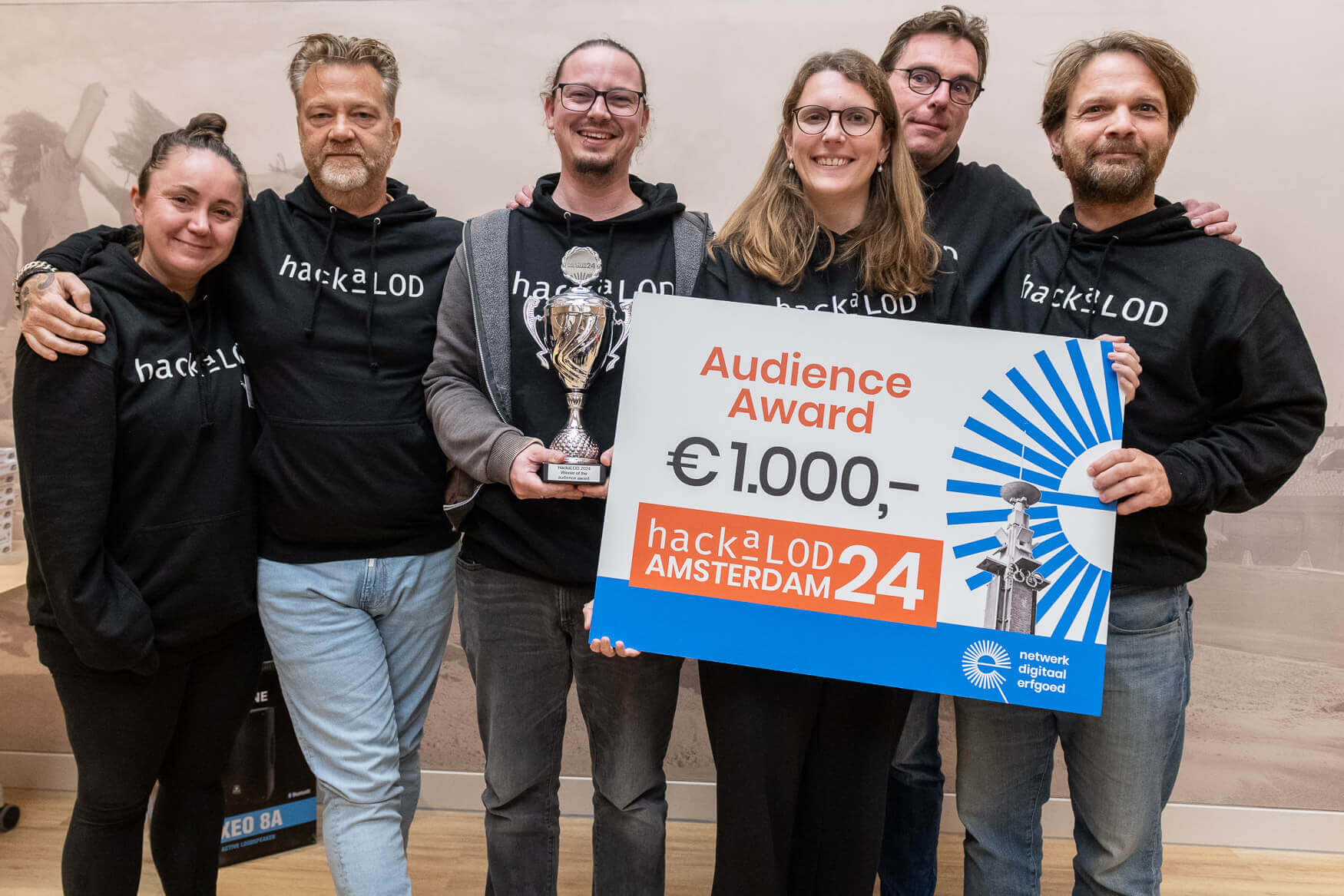
Team Mekluppie (winnaar publieksprijs)
Ilse Rombout, Mark Lindeman, Patrick van Zadel, Merel Geerlings, Ivo Zandhuis en Martijn Arts
Het project
Hoe kan digitaal erfgoed het clubgevoel van amateursvoetbalverenigingen vergroten? Hoe kunnen verschillende perspectieven op amateurvoetbal als aanvulling op sportarchieven beschikbaar worden gemaakt voor de clubs? Team Mijnkluppie ontwikkelde het concept voor MijnClub.nu: ‘Dit is hét digitale hart van de amateurvoetbalsport in Nederland. Alle clubs, alle archieven, beheerd en aangevuld door de clubs zelf. In Mijnclub.nu ontsluiten we archiefmateriaal vanuit verschillende bronnen per club. Voor nu zijn dat Voetbalarchieven.nl, Huygens Instituut, Geonames Wikidata, Stadsarchief Amsterdam, Noord-Hollands Archief en Dordrechts Archief, maar in potentie sluiten we alle archieven aan. Bovendien kunnen de clubs zelf hun eigen geschiedenis aanvullen. En dat volledig NDE- en DERA-compatibel!’. Check de code.
Het juryoordeel
‘Er is al veel erfgoedmateriaal over de geschiedenis van Nederlandse voetbalclubs beschikbaar in archieven, maar de archieven noch de clubs zelf beseffen dit. Door het project van Team Mekluppie kunnen we deze geschiedenis teruggeven aan de clubs.’

Team Café LODté
Bob Coret, Sablina Vis, Danny Eijsermans, Nicolas Dickinson, Heleen Wilbrink en Nine Claassen
Het project
De app PathFindr laat gebruikers op een speelse en actieve manier de geschiedenis van een stad ontdekken door het verzamelen van speelkaarten van straten. De app is niet alleen interessant voor toeristen, maar juist ook voor buurtbewoners die zich vaak afvragen naar wie hun straat is vernoemd. Via thema’s als feministen, verzetsstrijders, sporters en componisten – of door vrije verkenning – maakt de gebruiker kennis met de personen achter de straatnamen. Interessante feitjes worden als linked open data opgehaald uit diverse bronnen, zoals Adamlink en Wikidata. Door zichtbaar te maken welke verhalen worden belicht en welke ontbreken, biedt PathFindr gemeentes bovendien de kans om hun erfgoedgegevens te verrijken en de lokale geschiedenis inclusiever te maken. Check de code, de app en de API.
Het juryoordeel
‘We zagen een indrukwekkende reisgids die zowel locals als toeristen bedient, waarmee ze straatnamen kunnen opzoeken en de historische betekenis ervan kunnen ontdekken. De doordachte interface valt op, vooral de API-functie die gebruikers in staat stelt om hun eigen content toe te voegen.’
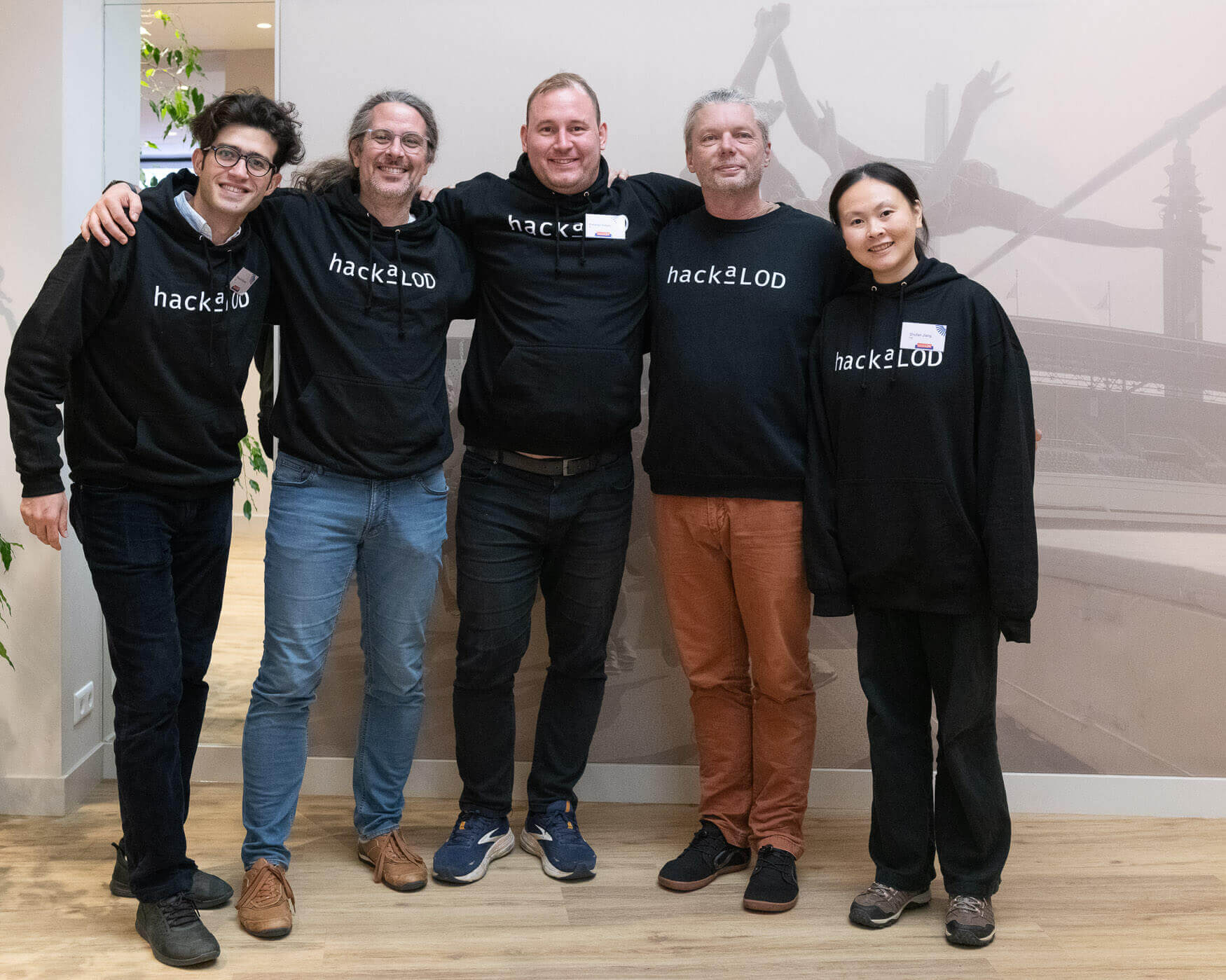
Team FIZ
Ebrahim Norouzi, Thorsten Schrade Kostiantyn Hubaiev, Etienne Posthumus en Shufan Jiang
Het project
Team FIZ ontwikkelde onder de noemer ‘MUShacka – Muziek verbindt alles’ een webapplicatie die op een vernieuwende manier bladmuziek doorzoekbaar maakt. De app verbindt de linked open data van de Universiteitsbibliotheek Amsterdam met bladmuziek van het Répertoire International des Sources Musicales (RISM) en data uit de knowledge graph van NFDI4Culture. Bijzonder is de manier van zoeken: in plaats van tekst in te typen, kunnen gebruikers muzikale noten ‘spelen’ op een digitaal pianoklavier of gewoon een vraag stellen in natuurlijke taal. Een slim taalmodel (LLM) vertaalt deze input naar gespecialiseerde zoekopdrachten in de databases. De gevonden muziekstukken, verrijkt met informatie uit Wikidata, worden niet alleen als bladmuziek getoond maar kunnen ook direct worden afgespeeld op de computer.
Het juryoordeel
‘Werken met muziek als cultureel erfgoed brengt specifieke uitdagingen met zich mee, en team FIZ verdient erkenning voor zijn aanpak. Het gebruik van Large Language Models om zoekopdrachten te optimaliseren was bijzonder indrukwekkend – een uitdagende taak die enorm veel potentie laat zien.’
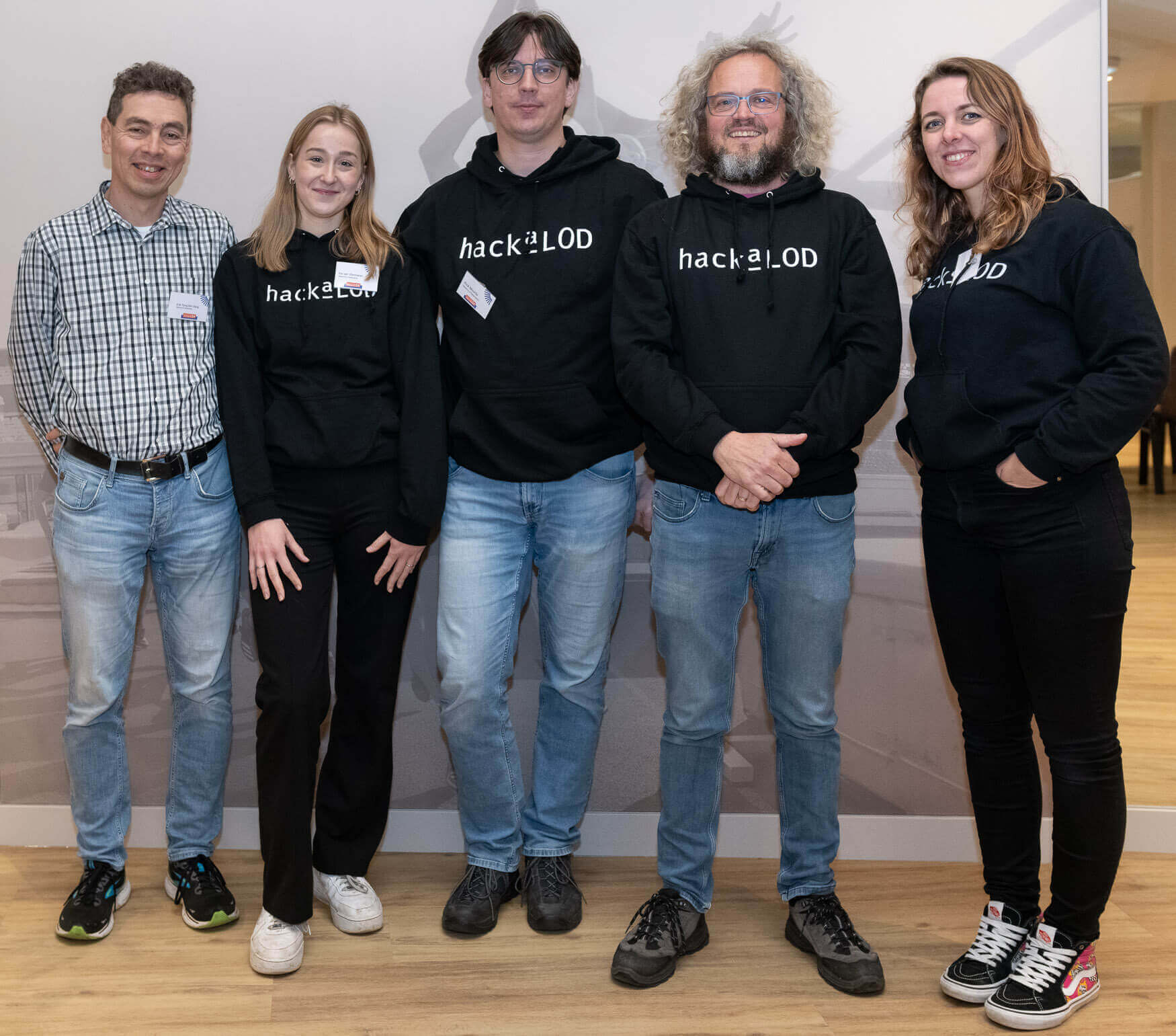
Team Slavernij in Paramaribo
Erik Tjong, Iris van Vlimmeren, Rick Mourits, Thunnis van Oort en Shannon van Muijden
Het project
Het project ‘ReLinking Identities’ verlegt de focus van het koloniale perspectief naar de verhalen van mensen die in slavernij leefden. Waar bestaande bronnen deze personen vaak ontmenselijkten door ze als bezit te beschouwen, combineert dit project verschillende koloniale bronnen op een nieuwe manier. Door het koppelen van gedigitaliseerde datasets als het Wijkregister van Paramaribo en het Slavenregister van Suriname – beide omgezet naar linked open data met de hulp van burgerwetenschappers – ontstaat een rijker beeld. Deze data wordt verder verrijkt met beeldmateriaal uit collecties van het Rijksmuseum, het Nationaal Archief van Suriname en Nederland, Delpher, de UB Leiden en andere bronnen. Zo ontstaat een informatieweb dat de tot slaafgemaakten in Paramaribo uit het midden van de 19e eeuw centraal stelt en hun verhalen eindelijk stem geeft.
Het juryoordeel
‘Het fascinerende aspect van de applicatie van Team Slavernij in Paramaribo is dat historische figuren, die honderden jaren onzichtbaar bleven, eindelijk zichtbaar worden met hun namen en adressen.’
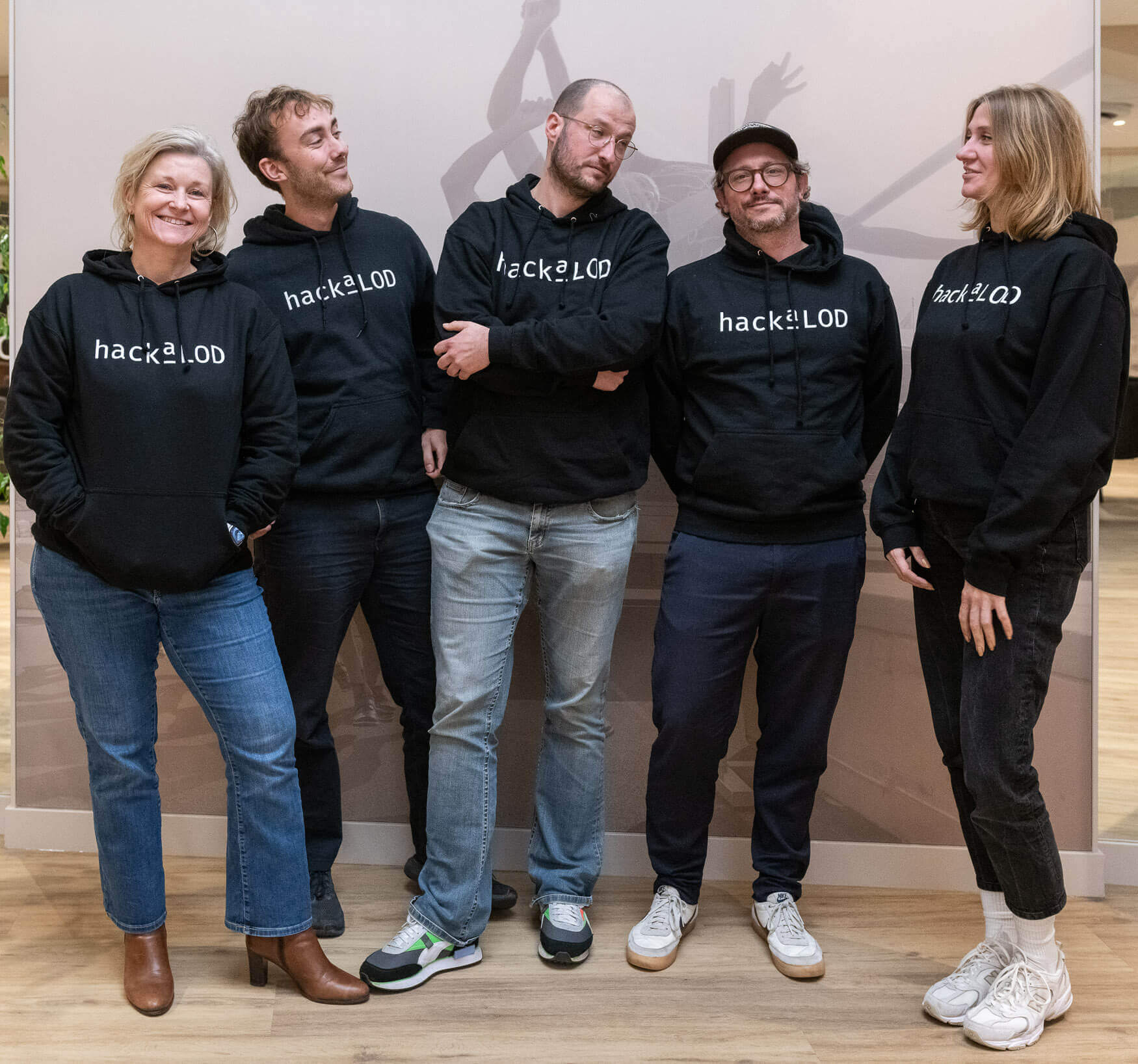
Team NADD
Bibi Bodegom, Simon Dirks Hay Kranen, Remco van Bladel en Eline de Graaf
Het project
Sport is emotie. Het gaat om helden, om verhalen die je raken en blijven hangen. Er is een schat aan audiovisueel materiaal en linked data, maar hoe breng je dat over op een aantrekkelijke manier? ‘Hiervoor hebben we Football Heroes bedacht. We brengen data uit de digitale wereld terug naar de fysieke in een meeslepende, vier minuten durende audiovisuele ervaring. Verdeeld over vier schermen en omgeven door krachtig geluid, ervaart iedere bezoeker een gepersonaliseerd verhaal. Volg iconen als Johan Cruijff en Ruud Gullit, en pioniers in het vrouwenvoetbal. Perfect voor musea, archieven of erfgoedinstellingen. Lees niet alleen over sport, maar beleef het.’
Het juryoordeel
‘Het project toonde toepassingen die we kunnen gebruiken voor andere dataprojecten, met een integratie van diverse multimediatechnieken. Toen we het eindresultaat in een fysieke ruimte bekeken, wisten we als jury niet waar we eerst moesten kijken. Door de data vanuit verschillende perspectieven te presenteren, brachten de multimediatechnieken de informatie echt tot leven.’
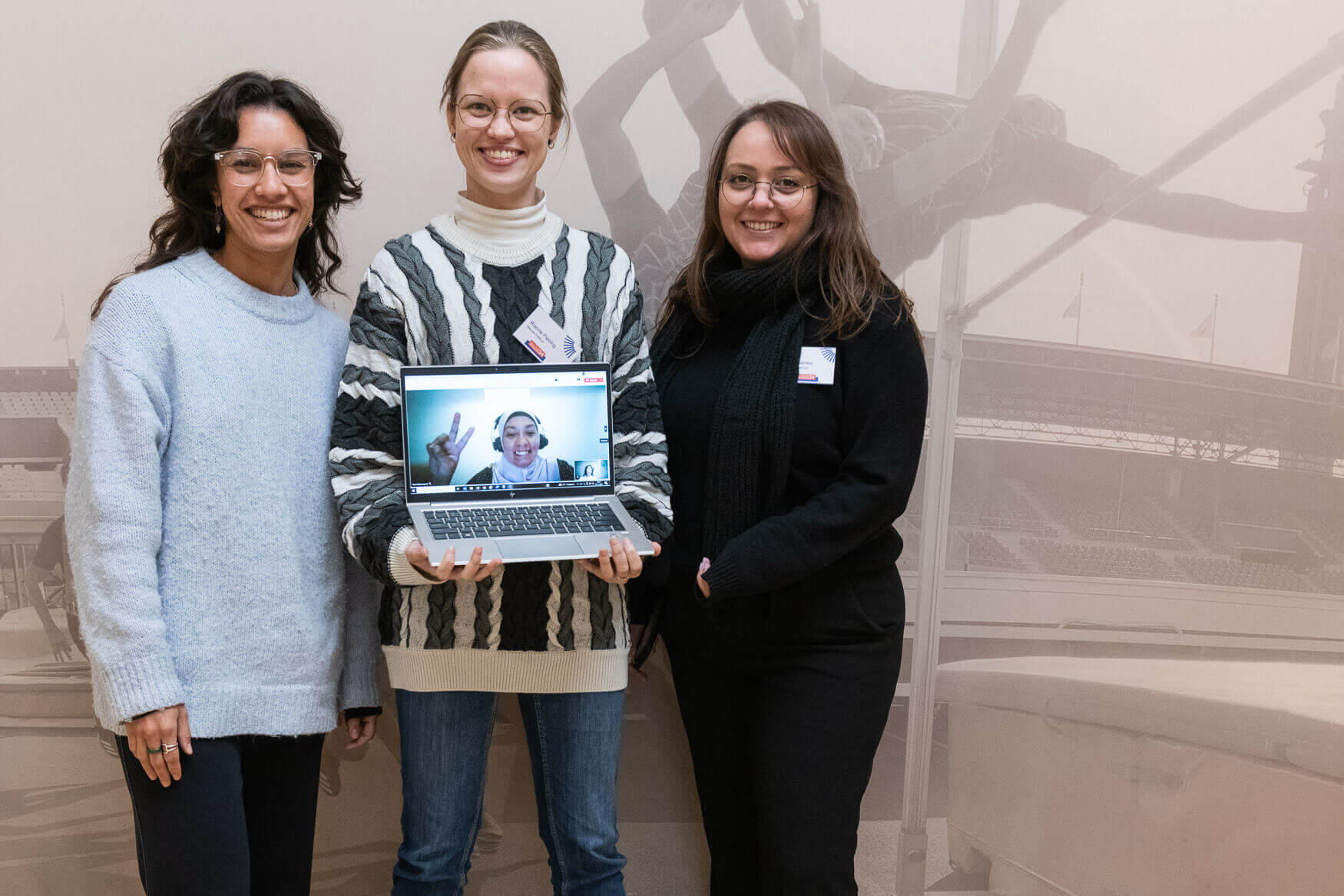
Team Ladies of Data
Lois Hutubessy, Rianne Piening, Nora Abdelmageed en Kelly James
Het project
The Ladies of Data, een samenwerking tussen teamleden van Nieuwe Instituut en RKD, hebben een innovatieve reconciliation service ontwikkeld. Hun tool, de LOD Linker, stelt collectiespecialisten in staat om automatisch entiteiten te matchen, niet alleen met een naam of een term, maar over meerdere properties. Dit wordt bereikt door middel van inbedding van knowledge graph, die gelijkenisscores gebruiken om te bepalen hoe semantisch dichtbij twee entiteiten zijn. Er zijn vier afzonderlijke experimenten uitgevoerd in drie datasets (Nieuwe Instituut, RKD, Wikidata) om de impact te beoordelen van factoren als taal en data points, inbeddingsgrootte, dataopschoning en databalans. De code voor dit project is openbaar beschikbaar.
Het juryoordeel
‘De innovatieve aanpak van het team om automatisch records tussen verschillende systemen te verbinden, maakte indruk op ons en voorziet in een cruciale behoefte binnen het erfgoedveld.’
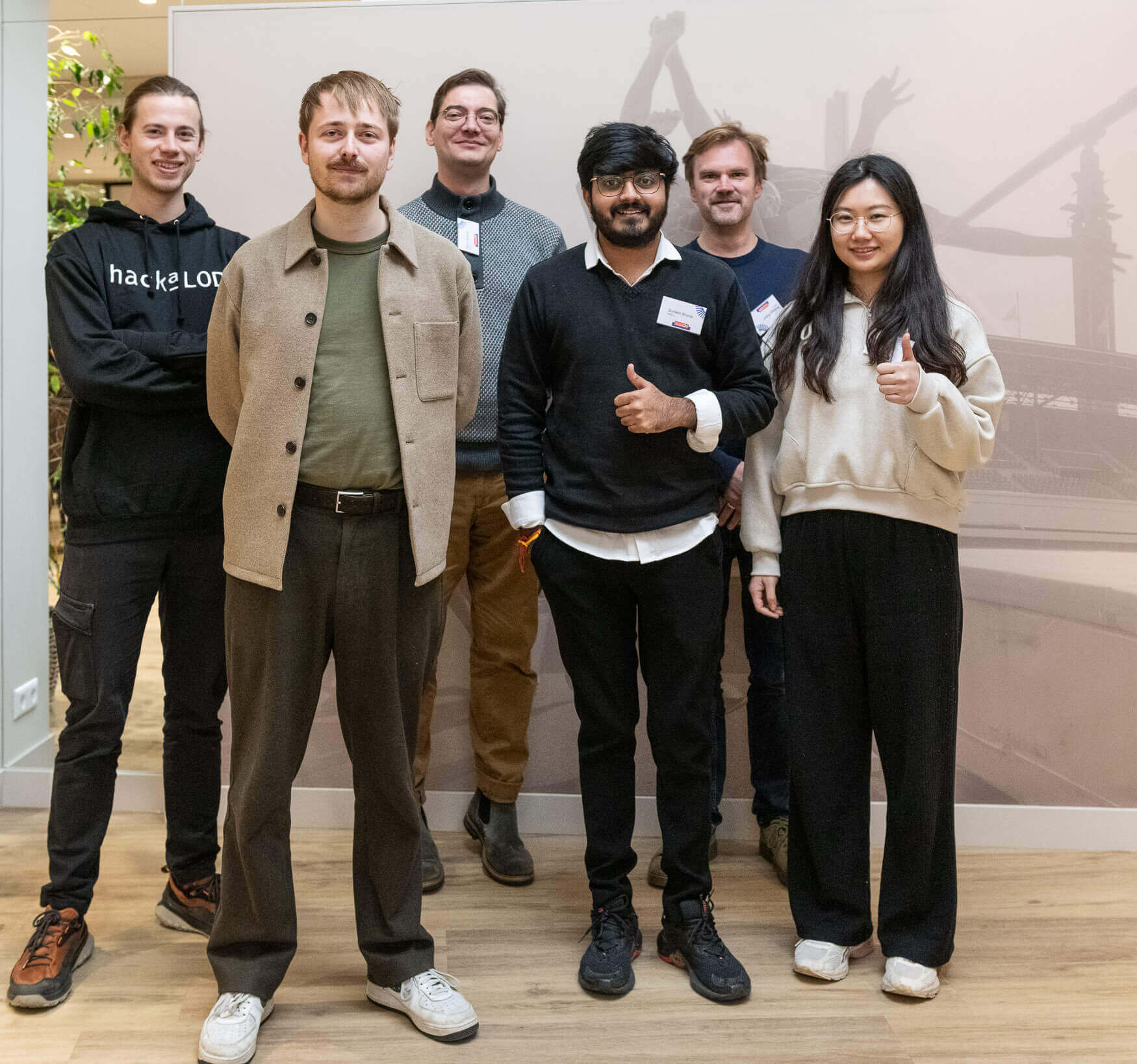
Team HAICu
Sjors Weggeman, Jesse Visser, Simon Kemper, Durlabh Shukla, Andreas Weber en Yahui Zhao
Het project
‘Qanun’ is een webapplicatie die aansluit bij de tentoonstelling ‘Wij Zijn Hier’ in het Nationaal Archief. De app laat gebruikers de geschiedenis van moslims in Nederland en overzee vanuit verschillende perspectieven verkennen. Via een interactieve chatbot en tijdlijn kunnen bezoekers zelf hun weg vinden door verhalen over gastarbeiders, bekeerde moslimkapers, wetenschappelijke expedities en Indonesische voetbalteams.
Het bijzondere aan ‘Qanun’ is hoe verschillende archiefbronnen met elkaar worden verbonden – van handgeschreven documenten tot gepubliceerde teksten en illustraties. Door slimme technologie (Retrieval Augmented Generation, RAG) combineert de chatbot informatie uit deze diverse bronnen tot een samenhangend verhaal.
Het juryoordeel
‘Het team heeft een indrukwekkende, tijdlijn-gebaseerde interface gecreëerd die naadloos schakelt tussen verschillende systemen en inspeelt op ons natuurlijke begrip van tijd en ruimte. Hun innovatieve gebruik van Large Language Models om archiefdata in het systeem te integreren was verrassend.’
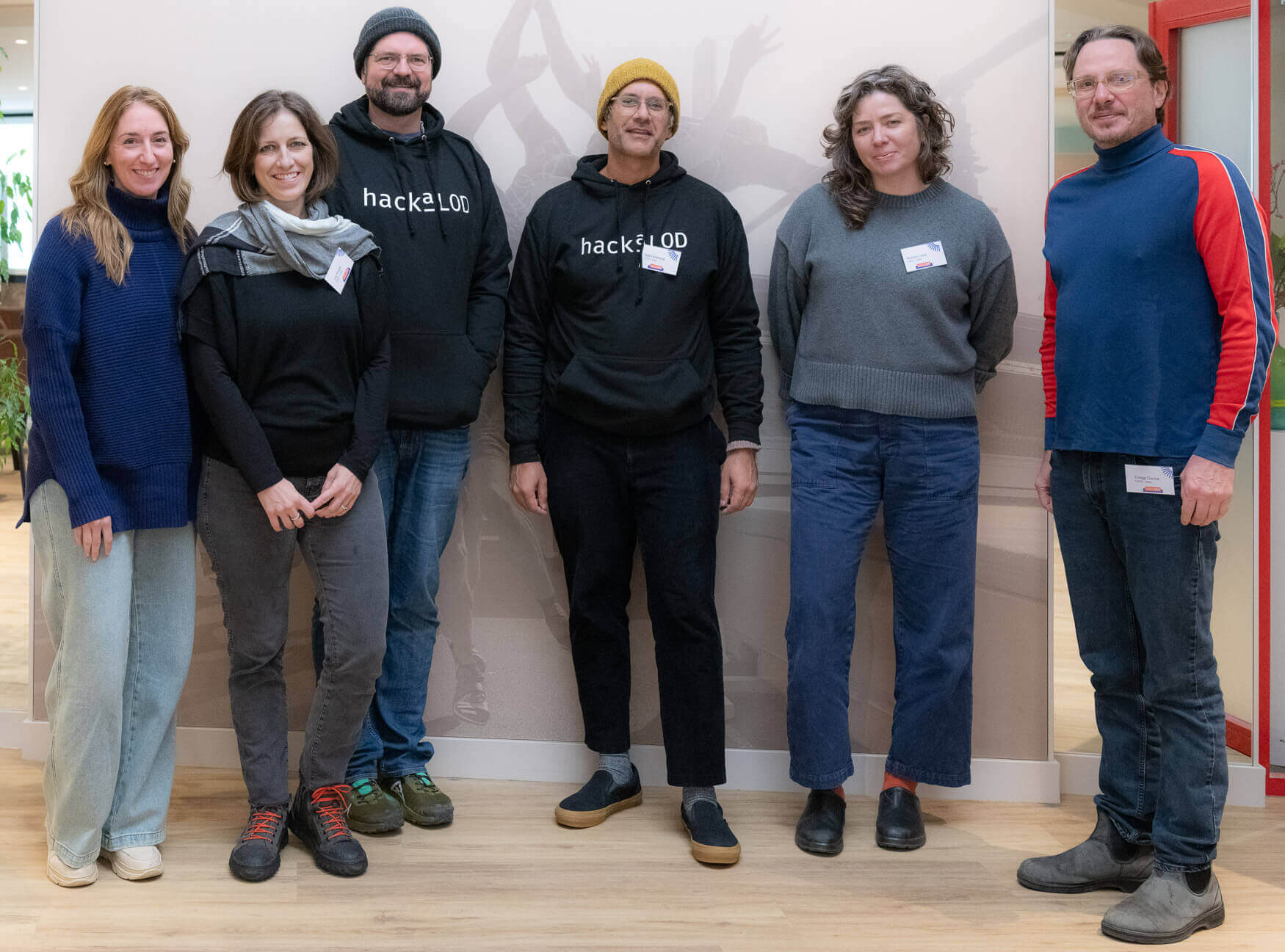
Team Getty
Sandra van Ginhoven, Lily Pregill, David Newbury, Nabil Kashyap, Alyssa Loera en Gregg Garcia
Het project
De afgelopen zeven jaar heeft Getty gewerkt aan het maken van een complexe dataset: de Getty Provenance Index in linked data. Dit is een enorme verzameling informatie over de verkoop van kunstwerken door handelaren in de 19e eeuw. Het is echter lastig te duiden omdat de dataset geen contextuele informatie bevat over de kunst of de betrokken personen; de focus ligt in plaats daarvan op de details van de financiële transacties.
Het team besloot om die context toe te voegen door gebruik te maken van linked data. De betrokken personen zijn via de Union List of Artist Names (ULAN) gekoppeld aan Wikidata, dat afbeeldingen en biografieën van zowel de koper als de kunstenaar biedt. Waar mogelijk zijn ook verbindingen gelegd met de huidige locatie van het kunstwerk in een museum, zodat een afbeelding van het kunstwerk kon worden toegevoegd.
Er is gekozen om deze informatie weer te geven in de vorm van een kassabon. Dit verbindt de historische informatie met de moderne ervaring en laat visueel zien wat voor soort informatie de herkomst-index bevat. Het project, genaamd ’Faces of Provenance’, is te vinden op https://facesofprovenance.netlify.app.
Het juryoordeel
‘Het team wist het doorgaans droge onderwerp “herkomst” om te zetten in een boeiende ervaring dankzij hun innovatieve interface. Door verschillende databases te koppelen, onthulden ze dat kunstwerken veel meer zijn dan alleen records – ze brachten hun rijke historische context tot leven.’
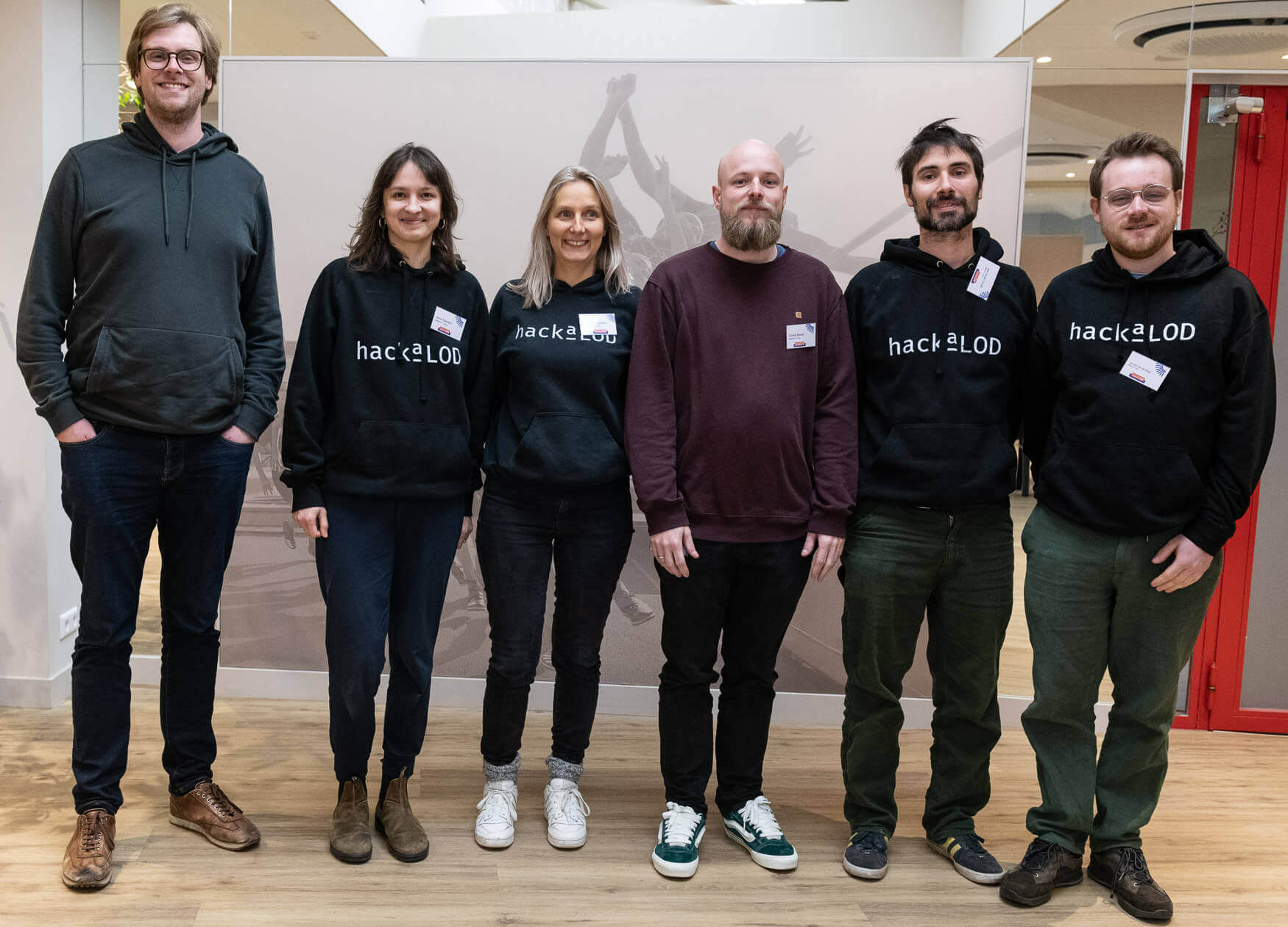
Team Triply/meemoo
Laurens Rietveld, Alina Saenko, Kathrin Dentler, Daniel Beeke, Miel Vander Sande en Lennert Van de Velde
Het project
Team Triply/meemoo, een Nederlands-Vlaams samenwerkingsverband van collega’s van Triply en meemoo, heeft gewerkt aan een app die fietsen en erfgoed samenbrengt. ‘Terwijl je door de Vlaamse en Nederlandse landschappen fietst (of thuis op je hometrainer zit), ontdek je kunstwerken en kunstenaars uit de omgeving via tekst en beeld. Zo wordt je fietstocht verrijkt met een cultureel erfgoedervaring.’
Het juryoordeel
‘Al fietsend ontdek je een nieuwe wereld, en dit project combineert op briljante wijze sport, linked data, kunst en technologie. Of je nu thuis, in een museum of buiten op de fiets bent (al hopen we dat gebruikers hun ogen op de weg houden!), de mogelijkheden van deze app zijn eindeloos.’
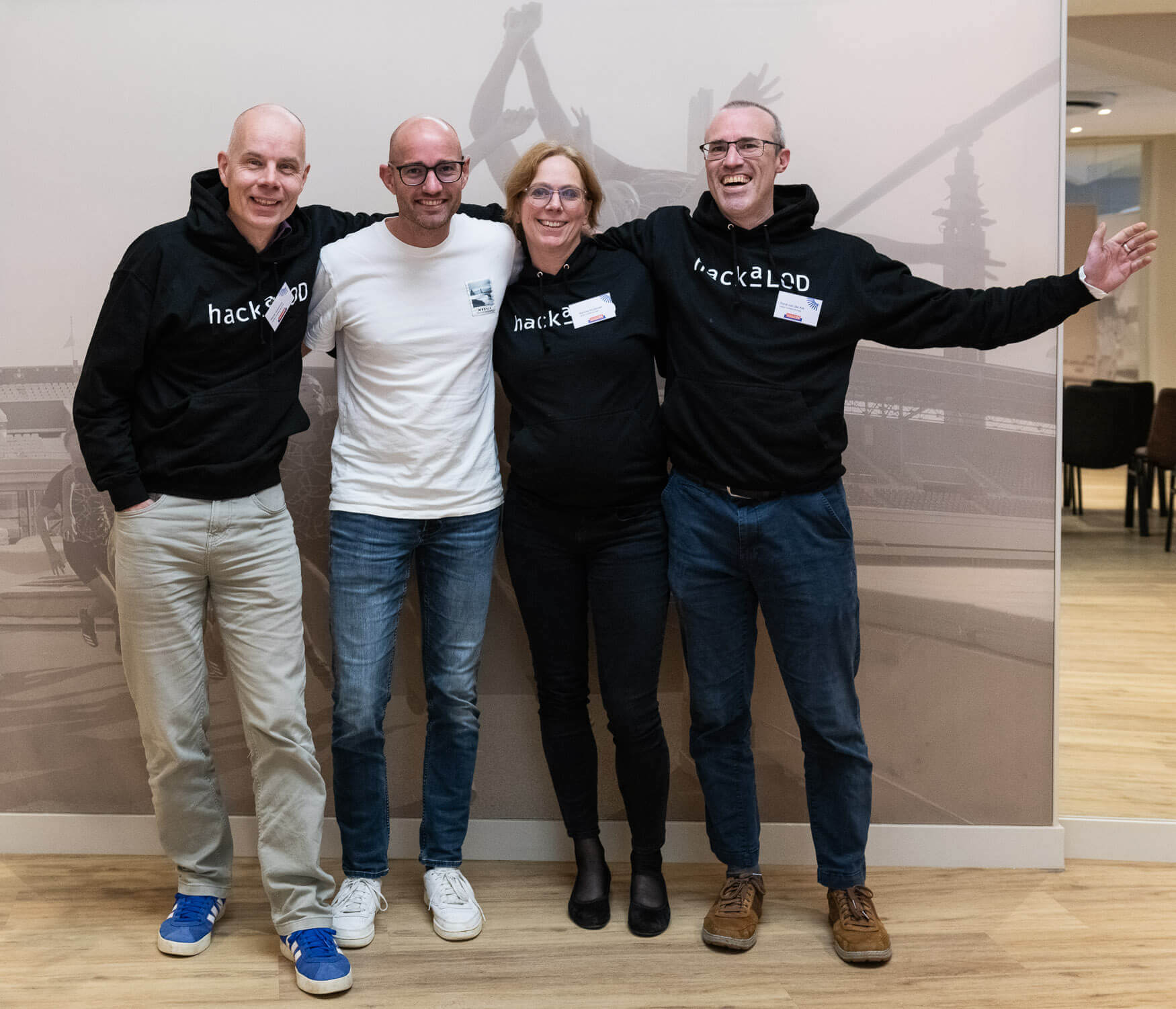
Team Lekker Ontketende Data
René Voorburg, Marco Min, Marieke Moolenaar en René van der Ark
Het project
Team Lekker Ontketende Data heeft met ‘Sport Heroes from our Past – The Game’ twee actuele thema’s gecombineerd: sportgeschiedenis en 50 jaar Surinaamse onafhankelijkheid.
Inspiratiebron waren drie sportboeken van de Surinaamse voetbalinternational Guno Hoen (1922-2010) uit de DBNL. In deze boeken beschrijft Hoen met passie Surinaamse sporters en hun betekenis voor de sport, zoals de ‘Canon-Shooter’ en ‘The Man with Thousand Arms’. Zijn nalatenschap omvat ook een fotocollectie die de basis vormde voor het Sportmuseum in Paramaribo.
‘Deze verhalen en de kleurrijke bijnamen inspireerden tot een online spel over deze sporthelden. Omdat er nog geen linked data beschikbaar was, creëerden we zelf een RDF-dataset met behulp van AI. Deze bevat personalia, bijnamen, sportclubs en links naar Wikidata, foto’s en artikelen.
Het resultaat is een interactief spel waarin spelers sporten koppelen aan foto’s van sporthelden, met hints uit de RDF-dataset. Het concept leent zich uitstekend voor museale toepassing, al vraagt dat nog wel om verdere ontwikkeling van zowel de dataset als het spel.’
Het juryoordeel
‘Dit project liet ons zien welke impact data kan hebben wanneer informatie niet openbaar beschikbaar is. Doordat sommige informatiebronnen nog niet gedigitaliseerd zijn, worden de inspanningen en successen van sommige sporters mogelijk niet erkend, wat tot maatschappelijke vooringenomenheid leidt. Dit team toonde aan hoe belangrijk het is om bepaalde papieren bronnen te digitaliseren om inclusiviteit en impact te vergroten.’
De vakjury van dit jaar
Erwin Folmer
Erwin Folmer is een ervaren onderzoeker en adviseur op het snijvlak van business en ICT. De afgelopen jaren gaf hij leiding aan het Data Science Team bij het Kadaster en was hij docent en onderzoeker bij de Universiteit Twente. Erwin heeft eerder als deelnemer aan HackaLOD meegedaan en zijn team is ook in de prijzen gevallen.
Claudia van Oppen
Claudia van Oppen is een FAIR & linked open data ambassadeur en directeur van de universiteitsbibliotheek van Maastricht University.
Jurryt van de Vooren
Jurryt van de Vooren is specialist in sporterfgoed en eigenaar van Sportgeschiedenis.nl. Sinds 1996 is hij de enige Amsterdammer die is afgestudeerd op Feyenoord.
Robert Sanderson
Robert Sanderson is directeur Digital Cultural Heritage aan de Yale University en heeft twintig jaar ervaring op het snijvlak van erfgoed en linked data. Zijn expertise ligt op het gebied van data-interoperabiliteit tussen organisaties. Robert heeft gewerkt aan OAI-ORE, Open Annotation, IIIF, JSON-LD en recentelijk aan het Linked Art-datamodel.
Geert-Jan Bogaerts
Geert-Jan Bogaerts is initiatiefnemer en voorzitter van de Stichting PublicSpaces, en hoofd van de afdeling Innovatie & Digitale Media en lid van het MT van de VPRO. Daarvoor was Geert-Jan docent Nieuwe Media aan de Masteropleiding Journalistiek van de Universiteit van Groningen en freelance consultant. Ook heeft hij als journalist gewerkt.
HackaLOD 2024: A Night of Innovation with Heritage Data
Eleven teams from four countries gathered at the Olympic Stadium in Amsterdam on the night of November 8-9. During the eighth HackaLOD, the premier hackathon for the heritage sector, they brought digital heritage to life in new and innovative ways — with surprising apps, games, and other applications that make heritage data accessible to everyone.
A Proven Formula
For ten years, HackaLOD has followed a successful formula: bring together a group of dedicated teams in a historical location for one night, provide good food and facilities, and let them work with the rich datasets from heritage organizations, along with new techniques like Linked Data and machine learning. The result? By the next day, there are always fresh ideas for apps, games, and other heritage applications. This eighth edition was no exception, as the teams once again delivered on this promise.
Building a Community
‘Bringing together creativity, knowledge, and enthusiasm creates a new kind of energy,’ says Enno Meijers, Chief Technology Officer at the NDE. ‘Even better is that a strong community is forming, thanks to the shared experience of the night—with all its challenges and fun. In this edition too, we saw familiar faces joining new teams—participants are finding each other with increasing ease.’
Interdisciplinary Teams
‘The difference between my first HackaLOD (nine years ago) and this recent edition is like night and day,’ says Richard Zijdeman (IISG) from team Mambo, which won the jury prize for their app LODLYMPICS. ‘Each year, there are more linked datasets, and the level keeps getting higher. Of course, this is due to our technical progress over the past decade. But the real strength lies in the growing interdisciplinarity: teams are now combining expertise in heritage, language, imagery, data, and software.’
A Maturing Field
Juror Erwin Folmer has observed the same development: ‘The field has reached a new level of maturity, with teams confidently creating and applying linked data. The interfaces they have developed show promising potential for future applications.’ Enno Meijers adds, ‘The quality of projects keeps rising—not only the winners are impressive, but all teams consistently deliver stronger results.’
Inspiration and Learning
‘We had an amazing time as a team,’ says Ilse Rombout (Amsterdam City Archives) from team Mekluppie, winner of the audience prize with MijnClub.nu. ‘We learned from each other, were inspired by the other teams, and had a lot of fun.’
The Power of Linked Data
‘This entire experience gives me and my colleague Merel Geerlings energy to further promote linked open data within the Amsterdam City Archives,’ says Ilse. ‘It’s incredibly important to show why we do this work. At an event like HackaLOD, you prove that linked open data works and that you can offer users something that would otherwise be impossible.’
Photo’s: Jacqueline van der Kort / Beeldstudio KB

Team Mambo (winner of the jury prize)
Teresa Paccosi, Bruno Sartini, Andrea Schimmenti, Gauri Bhagwat, Marieke van Erp en Richard Zijdeman
The project
The inspiration came from sports historian Jurryt van de Vooren during the HackaLOD Summer Party, where he encouraged potential participants to look beyond just sports heroes and GOATs (the greatest of all times).
The team worked with a wide range of sources: texts from Wikinews and newspaper articles from Delpher, images from 153 archives via Europeana, and linked data from Wikidata. Cleaning and enriching the data yielded immediate results: initially, they found 400 athletes in Wikidata using a complex query, but after standardizing terms in Wikidata, this number grew to over 14,000 with a simple query. Using advanced language analysis techniques, the team not only discovered relevant texts but also revealed the differing ways male and female athletes, as well as athletes of color, are portrayed.
All these insights and data are brought together in the app ‘LODLYMPICS’, where users can explore the material and create their own sports stories.
The expert jury’s verdict
‘Historical connections can now be analyzed as if they’re happening in real-time, offering new ways to connect the dots of history and conduct research.’

Team Mekluppie (winner of the audience prize)
Ilse Rombout, Mark Lindeman, Patrick van Zadel, Merel Geerlings, Ivo Zandhuis and Martijn Arts
The project
How can digital heritage enhance the sense of community within amateur football clubs? How can different perspectives on amateur football be made available to clubs as a supplement to sports archives? Team Mijnkluppie developed the concept for MijnClub.nu: ‘This is the digital heart of amateur football in the Netherlands. All clubs, all archives, managed and enriched by the clubs themselves. In Mijnclub.nu, we provide access to archival material from various sources for each club. Currently, these include Voetbalarchieven.nl, the Huygens Institute, Geonames Wikidata, Amsterdam City Archives, the North Holland Archives, and the Dordrecht Archive, but potentially, all archives can be connected. Clubs can add to their own history. And it’s fully NDE- and DERA-compliant!’ Code: www.mijnclub.nu.
The expert jury’s verdict
‘There’s already a lot of history about Dutch football clubs available in archives, but neither the archives nor the clubs themselves realize this.

Team Café LODté
Bob Coret, Sablina Vis, Danny Eijsermans, Nicolas Dickinson, Heleen Wilbrink and Nine Claassen
The project
The PathFindr app allows users to discover a city’s history in a playful and engaging way by collecting street-themed cards. The app is not only interesting for tourists but also for local residents who often wonder whom their street is named after. Through themes such as feminists, resistance fighters, athletes, and composers—or by free exploration—users get to know the people behind the street names. Fun facts are retrieved as Linked Open Data from various sources like Adamlink and Wikidata. By highlighting which stories are represented and which are missing, PathFindr also gives municipalities the opportunity to enrich their heritage data and make local history more inclusive. Code, app, API.
The expert jury’s verdict
‘We encountered an impressive travel guide that serves both locals and tourists, enabling them to look up street names and discover their historical significance. The thoughtful interface stands out, particularly its API feature which allows users to contribute their own content.’

Team FIZ
Ebrahim Norouzi, Thorsten Schrade Kostiantyn Hubaiev, Etienne Posthumus and Shufan Jiang
The project
Under the name ‘MUShacka – Music Connects Everything’, Team FIZ developed a web application that innovatively makes sheet music searchable. The app connects the Linked Open Data from the University Library of Amsterdam with notated music from the Répertoire International des Sources Musicales (RISM) and data from the NFDI4Culture knowledge graph. The search method is unique: instead of typing text, users can ‘play’ musical notes on a digital piano keyboard or simply ask a question in natural language. A smart large language model (LLM) translates this input into specialized queries across the databases. The discovered musical pieces, enriched with information from Wikidata, are displayed as sheet music and can also be played directly on the computer.
The expert jury’s verdict
‘Working with music as cultural heritage poses distinct challenges, and team FIZ deserves recognition for their approach. Their use of Large Language Models to optimize queries was particularly impressive—a challenging task that shows tremendous promise.’

Team Slavernij in Paramaribo
Erik Tjong, Iris van Vlimmeren, Rick Mourits, Thunnis van Oort and Shannon van Muijden
The project
The project ‘ReLinking Identities’ shifts the focus from the colonial perspective to the stories of people who lived in slavery. Where existing sources often dehumanize these individuals by considering them as property, this project combines various colonial sources in a new way. By linking digitized datasets like the Paramaribo District Register and the Suriname Slave Register—both converted to linked open data with the help of citizen scientists—a richer picture emerges. This data is further enriched with images from collections of the Rijksmuseum, the National Archives of Suriname and the Netherlands, Delpher, Leiden University Library, and other sources. This creates an information web that centers on the enslaved individuals in mid-19th-century Paramaribo, finally giving voice to their stories.
The expert jury’s verdict
‘The fascinating aspect of Team Slavernij in Paramaribo’s application is that historical figures, who remained invisible for hundreds of years, are finally becoming visible with their names and addresses.’

Team NADD
Bibi Bodegom, Simon Dirks Hay Kranen, Remco van Bladel and Eline de Graaf
The project
Sport is emotion. It’s about heroes, about stories that move you and stick with you. There is a wealth of audiovisual material and linked data, but how do you present it in an engaging way? ‘That’s why we created Football Heroes. We bring data from the digital world back into the physical in an immersive, four-minute audiovisual experience. Spread across four screens and surrounded by powerful sound, each visitor experiences a personalized story. Follow icons like Johan Cruijff, Ruud Gullit, and pioneers in women’s football. Perfect for museums, archives, or heritage institutions. Don’t just read about sports—experience it.’
The expert jury’s verdict
‘The project showcased applications that we can use for other data projects, integrating diverse multimedia techniques. When taken into a physical room, we, as a jury, didn’t know where to look first. By viewing the data from different perspectives, multimedia techniques truly brought the information to life.’

Team Ladies of Data
Lois Hutubessy, Rianne Piening, Nora Abdelmageed and Kelly James
The project
The Ladies of Data, a collaboration between team members from Nieuwe Instituut and RKD, have developed an innovative reconciliation service. Their tool, the LOD Linker, enables collection specialists to automatically match entities not just by name or terms, but across multiple properties. This is achieved through knowledge graph embeddings, which use similarity scores to determine how semantically close two entities are. Four distinct experiments were conducted across three datasets (Nieuwe Instituut, RKD, Wikidata) to assess the impact of factors such as language and data points, embedding size, data cleaning, and data balance. The code for this project is publicly available.
The expert jury’s verdict
‘The team’s innovative approach to automatically connecting records across different systems impressed us, addressing a crucial need in the heritage field.’

Team HAICu
Sjors Weggeman, Jesse Visser, Simon Kemper, Durlabh Shukla, Andreas Weber and Yahui Zhao
The project
‘Qanun’ is a web application that complements the ‘Wij Zijn Hier’ exhibition at the Dutch National Archive. The app allows users to explore the history of Muslims in the Netherlands and overseas from different perspectives. Through an interactive chatbot and timeline, visitors can navigate stories about guest workers, Muslim convert privateers, scientific expeditions, and Indonesian football teams.
What makes ‘Qanun’ unique is how it connects various archival sources—from handwritten documents to published texts and illustrations. Using advanced technology (Retrieval Augmented Generation, RAG), the chatbot combines information from these diverse sources into a cohesive narrative.
The expert jury’s verdict
‘The team created an impressive timeline-based interface that seamlessly transfers between different systems, leveraging our natural understanding of time and space. Their innovative use of Large Language Models to extract archival data into the system was particularly remarkable.’

Team Getty
Sandra van Ginhoven, Lily Pregill, David Newbury, Nabil Kashyap, Alyssa Loera and Gregg Garcia
The project
Over the past seven years, Getty has been working on producing a complex data set: the Getty Provenance Index in linked data. It is a vast trove of information about the sale of artworks by dealers in the 19th century, but it’s difficult to explain because it does not contain contextual information about the art or people involved, focusing instead on the details of the financial transaction.
The team decided to try and add that context using linked data, Connecting the people through the Union List of Artist Names (ULAN) to Wikidata, providing images and biographies of both the purchaser and the artist. We also connected, when possible, to the current location of the artwork in a museum. This allowed the team to pull in an image of the artwork.
They decided to show this information in the form of a shopping receipt. This connects the historical information to modern day experience, demonstrating visually the type of information that provenance index holds. The project, titled Faces of Provenance, is available at facesofprovenance.netlify.app.
The expert jury’s verdict
‘The team transformed the typically dry subject of provenance into an engaging experience through their innovative interface. By connecting different databases, they revealed that artworks are far more than mere records—bringing their rich historical context to life.’

Team Triply/meemoo
Laurens Rietveld, Alina Saenko, Kathrin Dentler, Daniel Beeke, Miel Vander Sande and Lennert Van de Velde
The project
Team Triply/meemoo, a Dutch-Flemish collaboration between colleagues from Triply and meemoo, has worked on an app that brings cycling and heritage together. ‘While cycling through the Flemish and Dutch landscapes (or riding at home on your exercise bike), you can discover artworks and artists from the area through text and images. In this way, your bike ride is enriched with a cultural heritage experience.’
The expert jury’s verdict
‘Cycling opens up a world of discovery, and this project brilliantly combines sports, linked data, art, and technology. Whether at home, in a museum, or cycling outdoors (though we hope users will keep their eyes on the road!), the possibilities of this app are endless.’

Team Lekker Ontketende Data
René Voorburg, Marco Min, Marieke Moolenaar and René van der Ark
The project
Team Lekker Ontketende Data combined two timely themes with Sport Heroes from our Past – The Game: sports history and 50 years of Surinamese independence.
The inspiration came from three sports books by the Surinamese football international Guno Hoen (1922-2010) from the DBNL. In these books, Hoen passionately describes Surinamese athletes and their significance for the sport, with figures like the ‘Canon-Shooter’ and ‘The Man with Thousand Arms.’ His legacy also includes a photo collection that formed the basis for the Sports Museum in Paramaribo.
‘These stories and the colorful nicknames inspired an online game about these sports heroes. Since no linked data was available, we created an RDF dataset ourselves using AI. This includes personal information, nicknames, sports clubs, and links to Wikidata, photos, and articles.
The result is an interactive game in which players match sports to photos of sports heroes, with hints from the RDF dataset. The concept is ideal for museum applications, though further development of both the dataset and the game will be needed.’
The expert jury’s verdict
‘This project showed us what impact data can have when information isn’t publicly available. Due to the fact that some information sources are not yet digitized, the efforts, successes of some sportspeople might not be recognized, which creates societal biases. This team showed how important it is to digitize some paperback resources to increase inclusivity and impact.’
This Year’s Expert Jury
Erwin Folmer
Erwin Folmer is an experienced researcher and advisor at the intersection of business and ICT. In recent years, he led the Data Science Team at the Kadaster and served as a lecturer and researcher at the University of Twente. Erwin has previously participated in HackaLOD as a team member, with his team even winning an award.
Claudia van Oppen
Claudia van Oppen is a FAIR & linked open data ambassador and the director of the University Library at Maastricht University.
Jurryt van de Vooren
Jurryt van de Vooren is a specialist in sports heritage and the owner of Sportgeschiedenis.nl. Since 1996, he has been the only Amsterdam native to graduate with a thesis on Feyenoord.
Robert Sanderson
Robert Sanderson is the Director of Digital Cultural Heritage at Yale University and brings 20 years of experience at the crossroads of heritage and linked data. His expertise lies in data interoperability across organizations. Robert has contributed to projects such as OAI-ORE, Open Annotation, IIIF, JSON-LD, and, most recently, the Linked Art data model.
Geert-Jan Bogaerts
Geert-Jan Bogaerts is the founder and chairman of the PublicSpaces Foundation, as well as the Head of Innovation & Digital Media and a member of the Management Team at VPRO. Previously, Geert-Jan was a lecturer in New Media at the Master’s Journalism program at the University of Groningen and worked as a freelance consultant. He also has a background in journalism.
